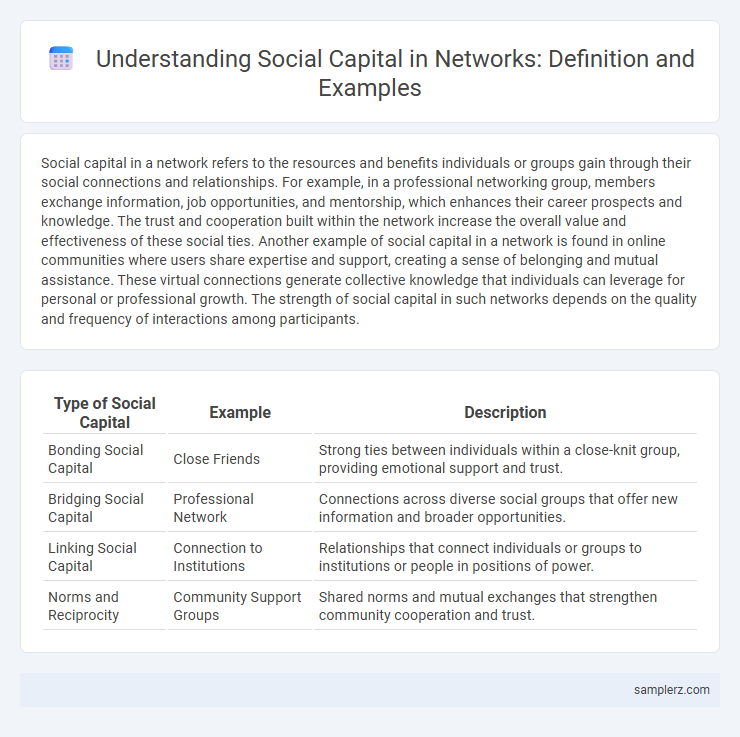Social capital in a network refers to the resources and benefits individuals or groups gain through their social connections and relationships. For example, in a professional networking group, members exchange information, job opportunities, and mentorship, which enhances their career prospects and knowledge. The trust and cooperation built within the network increase the overall value and effectiveness of these social ties. Another example of social capital in a network is found in online communities where users share expertise and support, creating a sense of belonging and mutual assistance. These virtual connections generate collective knowledge that individuals can leverage for personal or professional growth. The strength of social capital in such networks depends on the quality and frequency of interactions among participants.
Table of Comparison
| Type of Social Capital | Example | Description |
|---|---|---|
| Bonding Social Capital | Close Friends | Strong ties between individuals within a close-knit group, providing emotional support and trust. |
| Bridging Social Capital | Professional Network | Connections across diverse social groups that offer new information and broader opportunities. |
| Linking Social Capital | Connection to Institutions | Relationships that connect individuals or groups to institutions or people in positions of power. |
| Norms and Reciprocity | Community Support Groups | Shared norms and mutual exchanges that strengthen community cooperation and trust. |
Building Trust: Foundations of Social Capital in Networks
Building trust within social networks fosters strong relationships, enhancing cooperation and information flow among members. Trust acts as a crucial foundation for social capital by promoting reciprocity and reducing transaction costs in collective actions. High levels of trust enable efficient collaboration, driving community resilience and resource sharing.
Information Sharing: The Role of Social Ties
Social capital in networks significantly enhances information sharing by leveraging strong and weak social ties to facilitate knowledge exchange and resource access. Strong ties provide trust and reliable communication channels, while weak ties offer diverse information and broader network reach, critical for innovation and problem-solving. Efficient information dissemination through these social connections accelerates collective action and community development.
Reciprocity and Mutual Support Among Network Members
Reciprocity and mutual support among network members enhance social capital by fostering trust and cooperation, essential for resource exchange and collective problem-solving. For instance, community groups that regularly share expertise and assist each other during challenges exemplify strong social networks built on reciprocal relationships. These interactions not only strengthen individual connections but also create resilient social structures that facilitate long-term collaboration and social cohesion.
Bridging Social Capital: Connecting Diverse Groups
Bridging social capital in networks facilitates connections between diverse groups, enabling the exchange of new information and resources across different social circles. This type of social capital helps break down barriers, fostering inclusiveness and cooperation among organizations, communities, and individuals with varied backgrounds. Such networks are critical for innovation, social cohesion, and collective problem-solving in multicultural and multidisciplinary environments.
Bonding Social Capital: Strengthening Intra-group Relationships
Bonding social capital is exemplified by close-knit family networks and tight friendship groups where trust, emotional support, and shared norms reinforce strong intra-group cohesion. These relationships enable collective action and mutual aid, fostering resilience within communities. High levels of bonding social capital contribute to coordinated efforts in addressing local challenges and promoting group identity.
Mentorship and Knowledge Transfer in Social Networks
Mentorship within social networks fosters trust and reciprocal relationships that enhance social capital through the efficient transfer of expertise and professional guidance. Knowledge transfer occurs as experienced individuals share insights and skills, creating value that strengthens community bonds and collaborative opportunities. This dynamic interaction accelerates personal growth and collective problem-solving, maximizing the benefits of interconnected social resources.
Collaboration and Collective Action through Social Capital
Collaboration within networks thrives on social capital by fostering trust and shared norms among members, enabling efficient resource exchange and coordinated efforts. Social capital facilitates collective action by linking diverse individuals who contribute unique skills and knowledge, enhancing problem-solving capacity and innovation. Networks rich in social capital reduce transaction costs and mobilize support swiftly, driving successful community projects and social initiatives.
Influence and Social Norms in Network Structures
Influence within network structures drives individual behaviors through social capital by leveraging trust and reciprocity among connected members, fostering cooperation and shared norms. Social norms emerge as unwritten rules that regulate interactions, reinforcing conformity and strengthening community cohesion. Network density and centrality enhance the diffusion of influence, promoting collective action and sustaining social capital.
Community Engagement and Social Capital Outcomes
Community engagement fosters trust and reciprocity within networks, enhancing social capital by promoting collective action and mutual support. Active participation in local events, volunteer activities, and neighborhood associations strengthens relationships that facilitate resource sharing and problem-solving. These social capital outcomes improve community resilience, access to information, and overall well-being among members.
Digital Networks: Online Examples of Social Capital
Digital networks like LinkedIn exemplify social capital by enabling professionals to build trust, share knowledge, and access career opportunities through interconnected profiles. Online communities such as Reddit foster social capital by facilitating information exchange and mutual support among members with shared interests. Social media platforms like Facebook strengthen social capital by maintaining relationships and encouraging collaboration within diverse personal and professional networks.

example of social capital in network Infographic
 samplerz.com
samplerz.com